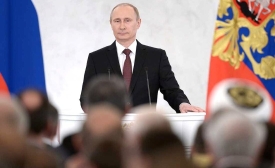propaganda
Though the Taliban has relied on technology for over a decade in the name of propaganda and public relations, its relationship with social media has only taken root in the last few years, in parallel with the rise of ISIS. Just as terrorist organizations in the Middle East have made Facebook pages, Telegram channels, and Twitter accounts, the Taliban has expanded the breadth and depth of its outreach to the international community in general and the news media in particular.
They called it Think Again, Turn Away. The concept? Use sarcasm as way to turn Islamic State images into an argument against their grim techniques of terror. The creator and producer? The U.S. State Department. Today, everyone agrees the message was worse than ineffective. It played right into the hands of the terrorists.
Revelations that Labor senator Sam Dastyari benefited from the largesse of Chinese benefactors have prompted several Australian journalists to draw attention to the problematic prospect of Chinese influence in Australia. [...] While important stories, these are not examples of soft power. Soft power is something different and the difference is important. Understanding it helps us analyse China’s attempts at influence.
Taiwan’s “soft power,” an intangible attraction based on the ideals and principles an actor – a government, country, organization, or individual- values, stands for, projects, and how the actor behaves at home and abroad. [...] Why is Taiwan still unable to connect with international audiences? Taiwan’s external communications are failing to help the island transit from the invisible to the visible.
In a day and age when the application of armed forces to resolve disputes between countries becomes less probable, the concept of "soft power" takes on a life of its own. Amongst the tools of political influence, the role of cinema as a soft power cannot be undermined. Bollywood’s ability to shape narratives in the course of diplomacy gives soft power a whole new connotation and also redefines "the best propaganda is not propaganda" dictum.
For twenty years, I have been researching and writing about Taiwan’s external communications – it’s propaganda, public diplomacy, cultural relations, and what is now called “soft power”. I remain committed to understanding how a state [...] can use external communications to project globally its values and ambitions, and thereby further its political and diplomatic agenda.
Thirty-three years ago this week, Soviet fighter jets shot down a Korean Airlines passenger jet that had strayed into Soviet airspace while on a scheduled flight from New York to Seoul. Two hundred and sixty-nine passengers and crew were killed, including a U.S. Congressman. At first, Moscow denied that this had happened, then it claimed that the commercial flight had been gathering intelligence. No apologies were ever made.

The USSR responded to negative press with denial and censorship. Now, Russia is relying on the same tactics.







